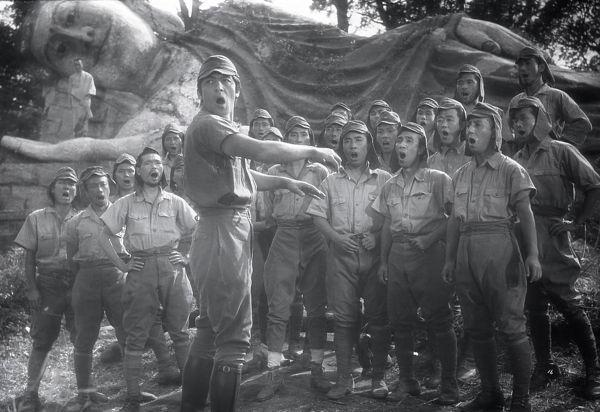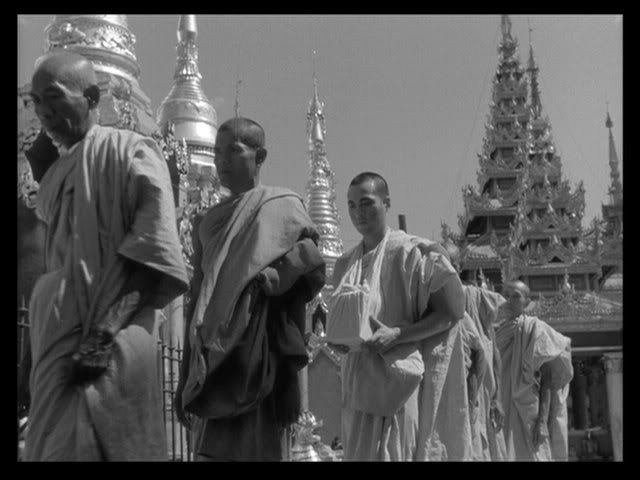
Stars:
Rentarô Mikuni, Shôji Yasui, Tatsuya MihashiStoryline
Mizushima is a soldier in the Japanese army in Burma in World War II. He's a good soldier and frequently plays his harp to entertain his fellow soldiers. When the war comes to an end, he is asked by the British to go into the mountains to try and convince a Japanese troop to surrender. Given only 30 minutes to convince them, Mizushima is unsuccessful - they would rather die with honor - and the British attack. Deeply affected by what has happened, he becomes a Buddhist monk, traveling the countryside burying the remains of Japanese soldiers. He is unable however to rejoin his brothers-in-arms.



User Reviews
You don't know how it is fighting a war, man! Putting history and
politics aside, I found this film confronted some very human emotions
involving war. No matter if this were a Japanese company of soldiers,
or a British company, most war movies don't touch on ideas like you'll
find here. The film follows a company of Japanese soldiers, with little
or no supplies, attempting to reach the border of Thailand. The men
enjoy singing wherever they go, and are quite proud of their abilities.
It makes them think of their loved ones back home and gives them a
sense of unity and hope. one of the men, Mizushima, plays the harp with
natural talent, as he had never studied music before joining the army.
There is a great scene where the Japanese see the British troops hiding
in the forest, so they start to sing, tricking the British into
thinking they are oblivious to them. When the British then start
singing back, and both sides are singing together, it is a scene of
great joy and unity between all humans. Somehow it isn't even
cheesy.though it seems it could be, the way I'm writing this review.
The British notify the Japanese men that the war ended three days
earlier, when Japan surrendered. They are placed in a P.O.W. camp until
it is possible to send them all home. The commander of the Japanese
men attempts to fill his men's hearts with hope and pride, telling them
that together they will rebuild Japan. They are told that nearby, a
company of Japanese troops is in an ongoing skirmish with the British,
unreachable and unaware of the war's end. Mizushima, is given
permission to go and try to explain that Japan has surrendered,
promising his company that he'll catch up in Mudon. This turns out to
be a not very easy job, as the commanding officer is into the whole `I'm
not giving up until I die,' philosophy. Getting nowhere, Mizushima
questions their logic to try and persuade them their lives are worth
saving, as Japan needs to be rebuilt. The British only agreed to a 30
minute cease fire, and when that time is up, all the Japanese men are
killed. only Mizushima crawls out alive and is found by a Buddhist
monk. While he is taken care of by the monk, his company is sad and
anxious for his return. once healed, his intention is to walk to Mudon
and surprise all the men, so he sets out in Buddhist costume across
Burma. on his way he encounters many heaps and piles of rotting dead
Japanese soldiers, and he feels it important to give them a proper
burial.
These scenes are when Mizushima fully realizes the
extent of what war is all about. It's not about pride and hope, it's
about putting your life on the line. He is accepted by the Buddhist
church and decides to stay and live a simple life, honoring the dead
through prayer and burial. His men try to persuade him using a talking
parrot switcheroo, teaching a parrot to say `come home to Japan,
Mizushima' and giving it to him. He, in reply, sends back his parrot,
which he taught to say `no, I am staying here.' It is a pacifist
sentiment throughout, a great film covering the human emotional
perspective on war in a unique way.
Burmese Harp (ビルマの竪琴)Part-1
Burmese Harp (ビルマの竪琴)Part-2
'Books > Movies' 카테고리의 다른 글
| The Second Front (0) | 2017.05.20 |
|---|---|
| Dawn of the 4th Reich (0) | 2017.05.20 |
| 血战上海滩2 (2016) (0) | 2017.05.20 |
| Awakenings (0) | 2017.05.20 |
| Last Ride (0) | 2017.05.20 |